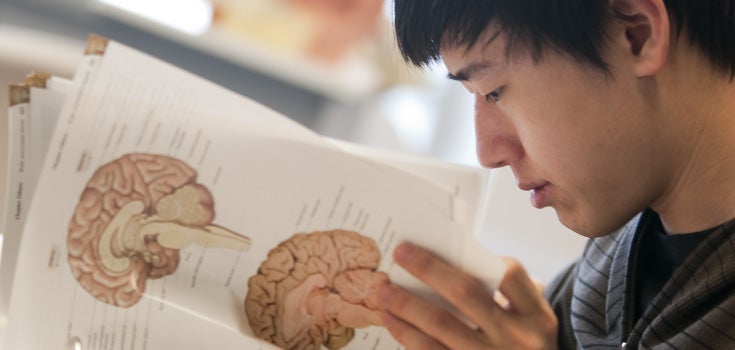
Nationwide, the $10 billion-a-year neuro-device industry is expected to increase about 22 percent annually, and URI is helping make Rhode Island a leader in understanding the most remarkable human organ – the brain.
With some 32 professors and researchers doing neurosciences work across about a dozen different departments, URI has launched an interdisciplinary graduate neurosciences program offering master of science and doctor of philosophy degrees as well as a certificate in neurosciences. With emphasis on biological sciences, biomedical engineering, molecular and cell biology, physical therapy, pharmacy and psychology, its goal is to train and graduate scientists and professors who will make big research contributions on some of the most debilitating brain disorders, such as Alzheimer’s and Parkinson’s diseases, epilepsy, multiple sclerosis, and more.
Walt Besio, associate professor of biomedical engineering, has invented a new electrode that can enhance detection of epileptic seizures and then treat them by injecting weak currents into the scalp. But he’s just one of many URI professors who have been conducting neuroscience research for years.
“When I started here in 2008 and realized I needed people with a strong biology background for my research, I started searching informally for people conducting neuroscience research at URI. I was surprised to learn just how many researchers here were focusing on this area. We’re in disparate disciplines, but now we’re linked through these neurosciences graduate programs,” he said.
In fact, the interdisciplinary nature of URI’s neurosciences program is what makes it so exciting. For example, a humanities professor looking at the ethics of brain research could become part of this program. So could a student interested in how the brain works with art or music, related to stress reduction, healing, or language development. And, the student who wants a graduate degree in engineering can also add a certification in neuroscience. “This network at URI will lead to even more opportunities for these interests,” said Biomedical Sciences Professor Nasser Zawia, who is the program’s director.
Professor Zawia is studying the link between childhood lead exposure and Alzheimer’s disease. He believes neuroscience is one of the last scientific frontiers where fundamental discoveries can still be made, especially with the influx of such new techniques as deep-brain stimulation, brain imaging, gene mapping and sequencing, and proteomics (the analysis of the structure, function, and interactions of the proteins produced by the genes of a particular cell, tissue, or organism).
If your big idea is a better understanding of the human brain, then URI wants you.
